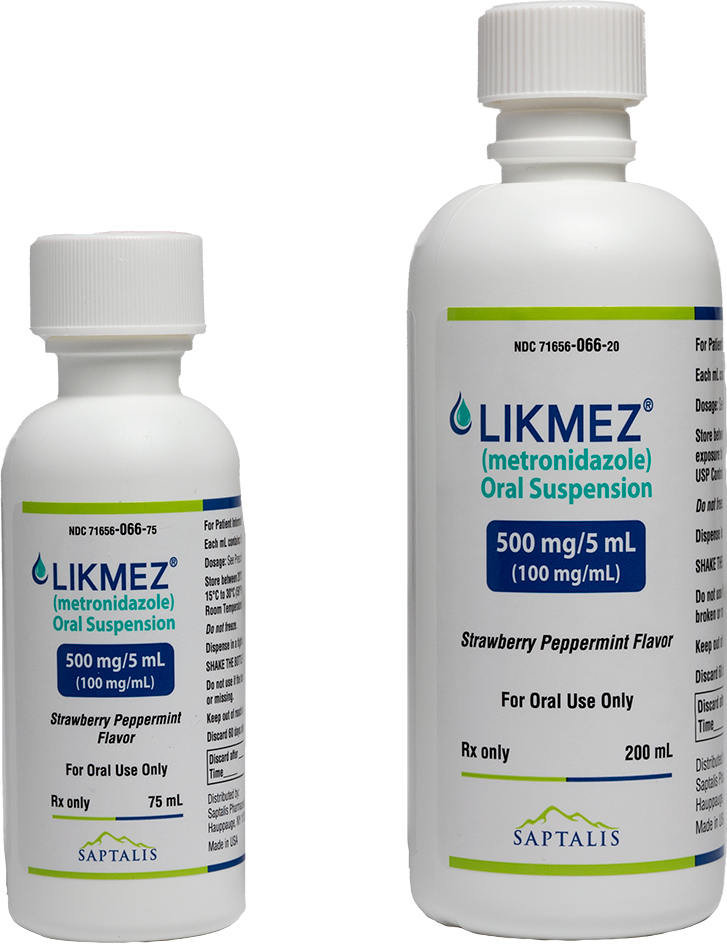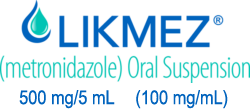
LIKMEZ®
(metronidazole) Oral Suspension
500 mg/5 mL (100 mg/mL)
A safe and efficacious option for patients who struggle with traditional oral tablet formulations.
LIKMEZ® is the first US FDA-approved NDA505(b)(2) liquid formulation of metronidazole for the treatment of antimicrobial infections that addresses the unmet need in patients with dysphagia-related discontinuation and possible antimicrobial resistance, avoiding potential risks associated with off-label drug compounding.
- Strawberry Peppermint flavor
- Convenient dosage form
- Stored at room temperature
LIKMEZ® is the only US FDA-approved liquid formulation of metronidazole, providing a novel prescribing option for patients with difficulty swallowing or experiencing taste-related hurdles.
Important Safety Information
INDICATIONS AND USAGE
LIKMEZ® (metronidazole) is a nitroimidazole antimicrobial indicated for:
- Trichomoniasis in adults
- Amebiasis in adults and pediatric patients
- Anaerobic Bacterial Infections in adults
To reduce the development of drug-resistant bacteria and maintain the effectiveness of LIKMEZ and other antibacterial drugs, LIKMEZ should be used only to treat or prevent infections that are proven or strongly suspected to be caused by bacteria.
Metronidazole has been shown to be carcinogenic in mice and rats. Avoid unnecessary use of LIKMEZ. Reserve LIKMEZ for use in the following indications: trichomoniasis, amebiasis, and anaerobic bacterial infections.
CONTRAINDICATIONS
- Hypersensitivity Reactions: LIKMEZ is contraindicated in patients with known hypersensitivity to metronidazole or other nitroimidazole derivatives.
- Psychotic Reactions with Disulfiram: LIKMEZ is contraindicated in patients who have used disulfiram within the last two weeks. Use of oral metronidazole is associated with psychotic reactions in alcoholic patients who were using disulfiram concurrently.
- Interaction with Alcohol: LIKMEZ is contraindicated in patients who consume alcohol or products containing propylene glycol during and for at least three days after LIKMEZ therapy. Use of oral metronidazole is associated with a disulfiram-like reaction to alcohol, including abdominal cramps, nausea, vomiting, headaches, and flushing.
- Cockayne Syndrome: LIKMEZ is contraindicated in patients with Cockayne syndrome.
WARNINGS AND PRECAUTIONS
- Potential for Carcinogenicity: Metronidazole has been shown to be carcinogenic in mice and rats. Reserve LIKMEZ for use in the following indications: trichomoniasis, amebiasis, and anaerobic bacterial infections.
- Central and Peripheral Nervous System Effects: Encephalopathy, aseptic meningitis, peripheral neuropathy (including optic neuropathy) and convulsive seizures have been reported with metronidazole. The appearance of abnormal neurological signs and symptoms demands the prompt evaluation of the benefit/risk ratio of the continuation of therapy.
- Fungal Superinfections: Known or previously unrecognized candidiasis may present more prominent symptoms during therapy with LIKMEZ and requires treatment with an antifungal agent.
- Blood Dyscrasias: LIKMEZ is a nitroimidazole and should be used with care in patients with evidence of or history of blood dyscrasia. Total and differential leukocyte counts are recommended before and after therapy.
- Drug-Resistant Bacteria: Prescribing LIKMEZ in the absence of a proven or strongly suspected bacterial infection or a prophylactic indication is unlikely to provide benefit to the patient and increases the risk of the development of drug-resistant bacteria.
- Severe Cutaneous Adverse Reactions: Severe cutaneous adverse reactions (SCARs) including toxic epidermal necrolysis (TEN), Stevens-Johnson syndrome (SJS), drug reaction with eosinophilia and systemic symptoms (DRESS), and acute generalized exanthematous pustulosis (AGEP) have been reported with the use of metronidazole. Symptoms can be serious and potentially life threatening. If symptoms or signs of SCARs develop, discontinue LIKMEZ immediately and institute appropriate therapy.
ADVERSE REACTIONS
The most common adverse reactions reported:
- Central and Peripheral Nervous System: The most serious adverse reactions reported in patients treated with metronidazole have been
convulsive seizures, encephalopathy, aseptic meningitis, optic and peripheral neuropathy, the latter characterized mainly by numbness
or paresthesia of an extremity. Persistent peripheral neuropathy has been reported in some patients receiving prolonged administration
of metronidazole. In addition, headache, syncope, dizziness, vertigo, incoordination, ataxia, confusion, dysarthria, irritability, depression,
weakness, and insomnia have been reported. - Gastrointestinal: The most common adverse reactions reported have been referable to the gastrointestinal tract, particularly nausea, sometimes accompanied by headache, anorexia, and occasionally vomiting; diarrhea; epigastric distress; and abdominal cramping and constipation.
- Mouth: A sharp, unpleasant metallic taste is not unusual. Furry tongue, glossitis, and stomatitis have occurred; these may be associated with a sudden overgrowth of Candida which may occur during therapy.
- Dermatologic: Erythematous rash and pruritus.
- Hematopoietic: Reversible neutropenia (leukopenia); reversible thrombocytopenia.
- Cardiovascular: QT prolongation has been reported, particularly when metronidazole was administered with drugs with the potential for prolonging the QT interval. Flattening of the T‑wave may be seen in electrocardiographic tracings.
- Hypersensitivity: Urticaria, erythematous rash, Stevens-Johnson Syndrome, toxic epidermal necrolysis, flushing, nasal congestion, dryness of the mouth (or vagina or vulva), and fever.
- Renal: Dysuria, cystitis, polyuria, incontinence, and a sense of pelvic pressure. Instances of darkened urine have been reported by approximately one patient in 100,000. Although the pigment which is probably responsible for this phenomenon has not been positively identified, it is almost certainly a metabolite of metronidazole and seems to have no clinical significance.
- Other: Proliferation of Candida in the vagina, dyspareunia, decrease of libido, proctitis, and fleeting joint pains sometimes resembling “serum sickness”. Cases of pancreatitis, which generally abated on withdrawal of the drug, have been reported.
Patients with Crohn’s disease are known to have an increased incidence of gastrointestinal and certain extraintestinal cancers. There have been some reports in the medical literature of breast and colon cancer in Crohn’s disease patients who have been treated with metronidazole at high doses for extended periods of time. A cause-and-effect relationship has not been established. Crohn’s disease is not an approved indication for LIKMEZ.
DRUG INTERACTIONS
- Disulfiram: Psychotic reactions have been reported in alcoholic patients who are using metronidazole and disulfiram concurrently. LIKMEZ is contraindicated in patients who have taken disulfiram within the last two weeks.
- Alcoholic Beverages: LIKMEZ is contraindicated in patients who consume alcohol or products containing propylene glycol during and for at least 3 days after therapy with LIKMEZ. Use of LIKMEZ with alcohol or other products containing propylene glycol is associated with a disulfiram-like reaction (abdominal cramps, nausea, vomiting, headaches, and flushing)
- Warfarin and other Oral Anticoagulants: Metronidazole has been reported to potentiate the anticoagulant effect of warfarin and other oral coumarin anticoagulants, resulting in a prolongation of prothrombin time. When LIKMEZ is prescribed for patients on this type of anticoagulant therapy, prothrombin time and INR should be carefully monitored.
- Lithium: In patients stabilized on relatively high doses of lithium, short-term use of LIKMEZ has been associated with elevation of serum lithium concentrations and signs of lithium toxicity due to the interaction between metronidazole and lithium. Monitor serum lithium and serum creatinine concentrations for several days after beginning treatment with LIKMEZ to detect any increase that may precede clinical symptoms of lithium toxicity.
- Busulfan: Metronidazole has been reported to increase plasma concentrations of busulfan, which can result in an increased risk for serious busulfan toxicity. Do not administer LIKMEZ concomitantly with busulfan unless the benefit outweighs the risk.
- Inhibitors of CYP450 Liver Enzymes: The simultaneous administration of LIKMEZ and drugs that decrease microsomal liver enzymes, such as cimetidine, may prolong the half-life and decrease plasma clearance of metronidazole.
- Inducers of CYP450 Liver Enzymes: The simultaneous administration of LIKMEZ and drugs that induce microsomal liver enzymes, such as phenytoin or phenobarbital, may accelerate the elimination of metronidazole, resulting in reduced plasma concentrations of metronidazole. Impaired clearance of phenytoin has also been reported.
- Drugs that Prolong the QT Interval: QT prolongation has been reported.
- Drug/Laboratory Test Interactions: Metronidazole may interfere with certain types of determinations of serum chemistry values. Values of zero may be observed.
USE IN SPECIFIC POPULATIONS
Pregnancy
Risk Summary: Most studies did not show an increased risk for congenital anomalies or other adverse fetal outcomes following metronidazole exposure during pregnancy.
Lactation
Risk Summary: There are no data on the effects of metronidazole on milk production.
Pediatric Use
The safety and effectiveness of LIKMEZ for the treatment of amebiasis have been established in pediatric patients.
The safety and effectiveness of LIKMEZ for the treatment of trichomoniasis and anaerobic bacterial infections have not been established
in pediatric patients.
Geriatric Use
In elderly geriatric patients, monitoring for LIKMEZ associated adverse events is recommended. Decreased liver function in geriatric patients can result in increased concentrations of metronidazole that may necessitate adjustment of metronidazole dosage.
Renal Impairment
Patients with end-stage renal disease may excrete metronidazole and metabolites slowly in the urine, resulting in significant accumulation of metronidazole metabolites. Monitoring for LIKMEZ associated adverse events is recommended.
Hepatic Impairment
Patients with hepatic impairment metabolize metronidazole slowly, with resultant accumulation of metronidazole in the plasma. For patients with severe hepatic impairment, reduce the dose of LIKMEZ by 50%. For patients with mild to moderate hepatic impairment, no dosage adjustment is needed but these patients should be monitored for LIKMEZ associated adverse reactions.
OVERDOSAGE
There is no specific antidote for metronidazole overdose; therefore, management of the patient should consist of symptomatic and supportive therapy.
In case of an overdose, patients should contact a physician, poison control center, or emergency room.
Please see full Prescribing Information, including BOXED WARNING.

